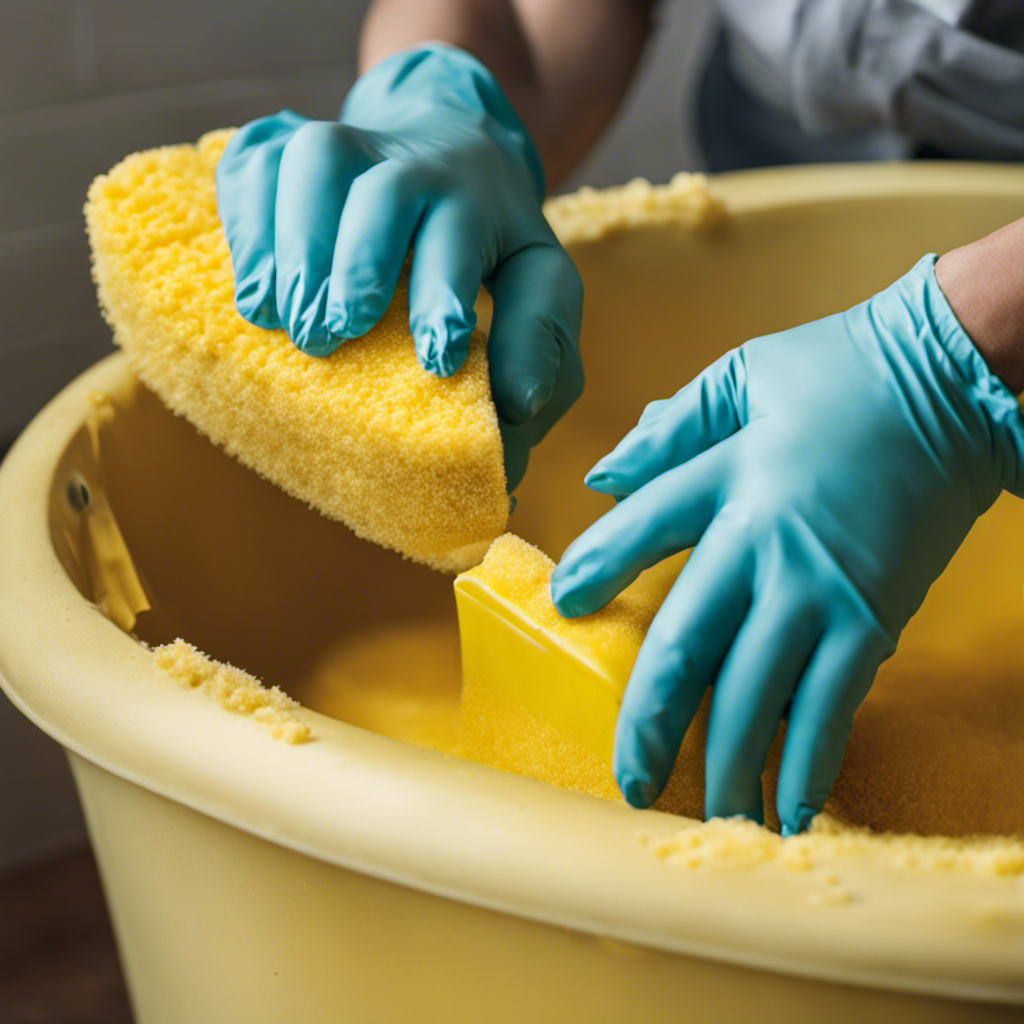As they say, ‘a hot bath can soothe the soul.’ But with so many bathtub materials to choose from, how do you know which one is best for you?
Well, fear not, because in this article, I’ll be diving into the pros and cons of various bathtub materials.
From the affordable and lightweight acrylic tubs, to the durable and classic cast iron ones, we’ll explore which material suits your needs and budget.
So sit back, relax, and let’s find the perfect bathtub material for you.
Key Takeaways
- Acrylic tubs are lightweight, easy to clean, and affordable compared to other materials.
- Fiberglass tubs are resistant to scratches and stains, but not as durable as acrylic tubs.
- Cast iron tubs offer exceptional strength and longevity, retain heat well, and are resistant to chipping and scratching.
- Stone resin tubs are made from crushed stone and resin for exceptional durability, require minimal maintenance, and maintain a pristine appearance for years.
Pros and Cons of Acrylic Bathtubs
Acrylic bathtubs are popular because they’re lightweight and easy to clean. They are made from a strong and durable material called acrylic, which is a type of plastic. One of the advantages of acrylic bathtubs is their affordability. They tend to be less expensive compared to other bathtub materials like fiberglass or porcelain-enameled steel. Additionally, acrylic bathtubs are available in a wide range of colors and designs, allowing homeowners to customize their bathroom according to their preferences.
However, there are also some disadvantages to consider. Acrylic bathtubs can scratch easily, and the scratches may be more visible compared to other materials. They are also prone to fading over time if exposed to direct sunlight. Despite these drawbacks, acrylic bathtubs remain a popular choice due to their affordability and versatility.
When comparing fiberglass and porcelain-enameled steel bathtubs…
Comparing Fiberglass and Porcelain-Enameled Steel Bathtubs
Comparing fiberglass and porcelain-enameled steel tubs, it’s important to consider their durability and maintenance requirements.
Fiberglass bathtubs are made from a combination of resin and glass fibers, making them lightweight and easy to install. They are also resistant to scratches and stains, making them low maintenance. However, fiberglass tubs are not as durable as acrylic bathtubs and can be prone to cracking or chipping over time.
On the other hand, porcelain-enameled steel tubs are known for their durability and resilience. They are made from a steel core coated with a layer of porcelain enamel, making them resistant to chipping and scratching. However, they can be heavier and require proper care to prevent the enamel from chipping.
The Benefits of Cast Iron Bathtubs
When it comes to durability and heat retention, you’ll love the benefits of cast iron bathtubs. Cast iron is known for its exceptional strength and longevity, making it a popular choice among homeowners. Not only do cast iron bathtubs withstand the test of time, but they also retain heat well, allowing for a longer, more relaxing soak.
Additionally, cast iron is resistant to chipping and scratching, ensuring that your bathtub remains in pristine condition. While copper bathtubs offer their own advantages, such as their unique patina and antimicrobial properties, and marble bathtubs exude luxury and elegance, cast iron bathtubs combine durability, heat retention, and classic style all in one.
Now, let’s explore the durability of stone resin bathtubs.
Exploring the Durability of Stone Resin Bathtubs
If you’re looking for a bathtub that offers both durability and style, stone resin is a great choice. Stone resin tubs are known for their exceptional durability, making them a long-lasting investment for your bathroom. The material is made by combining crushed stone and resin, resulting in a strong and sturdy product that can withstand daily use and resist cracks and chips.
Additionally, stone resin tubs require minimal maintenance, making them an attractive option for those looking for a hassle-free bathing experience. With proper care and cleaning, these tubs can maintain their pristine appearance for years to come.
Here’s a quick overview of the durability and maintenance of stone resin tubs:
Durability:
- Resistant to cracks and chips
- Withstands daily use
- Long-lasting investment
Maintenance:
- Requires minimal maintenance
- Easy to clean
- Maintains pristine appearance
Which Bathtub Material Is Best for Your Budget?
Stone resin tubs are a great option for those on a budget due to their durability and low maintenance requirements.
When comparing the cost effectiveness of fiberglass and acrylic tubs, it really depends on your specific needs and preferences. Fiberglass tubs are generally more affordable upfront, but they may require more maintenance and can be less durable in the long run.
On the other hand, acrylic tubs are slightly more expensive, but they offer better durability and are easier to clean and maintain.
If you’re looking for budget-friendly bathtub alternatives, consider cast iron or steel tubs. These options are more affordable compared to stone resin, fiberglass, or acrylic tubs, but they still offer decent durability and functionality.
Ultimately, it’s important to consider your budget and the long-term value when choosing the best bathtub material for you.
Conclusion
In conclusion, after carefully considering the pros and cons of various bathtub materials, it is clear that there is no one-size-fits-all answer to the question of which material is best.
However, one interesting statistic to note is that acrylic bathtubs are the most popular choice among homeowners, accounting for approximately 50% of bathtub sales in the United States. This could be due to their affordability, versatility, and ease of installation.
Ultimately, the best bathtub material for you will depend on your budget, preferences, and specific needs.









